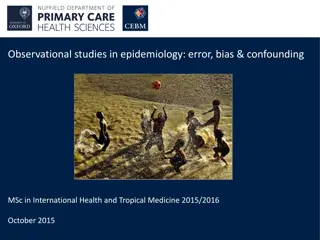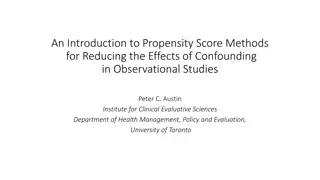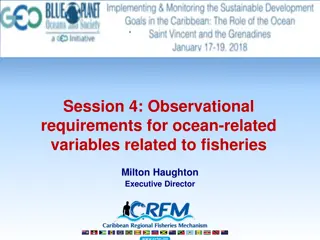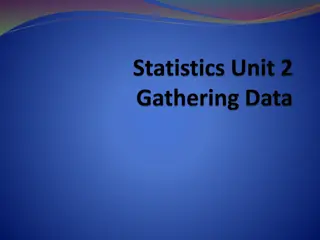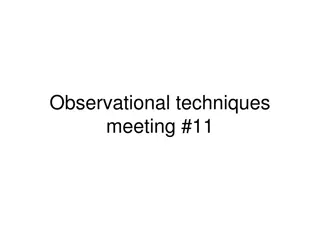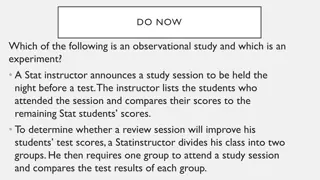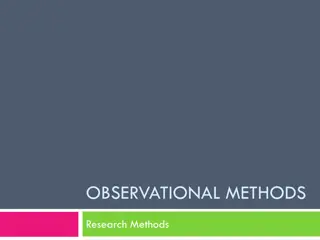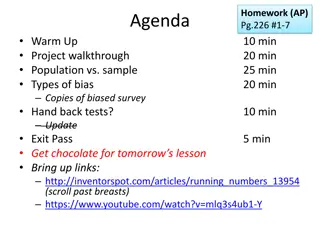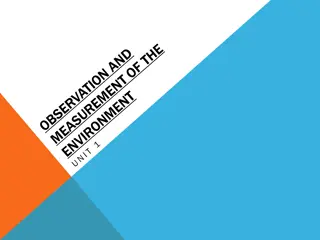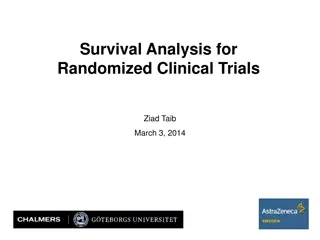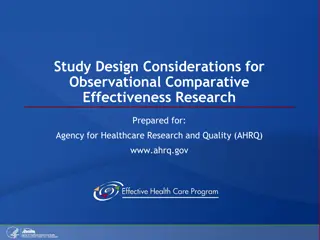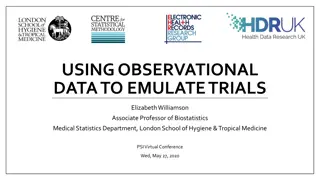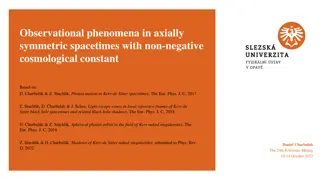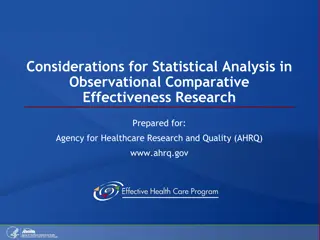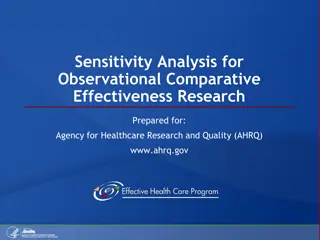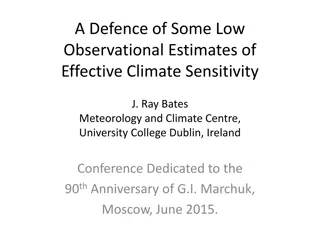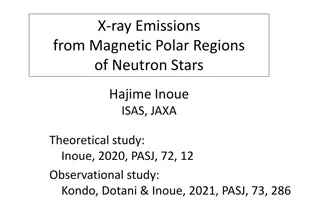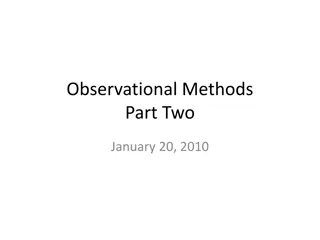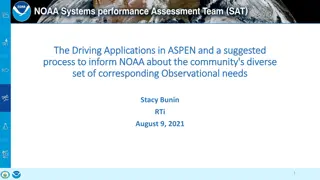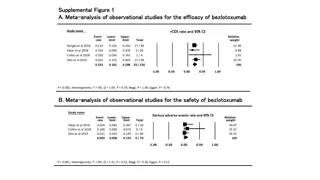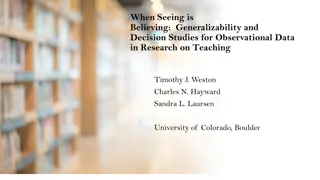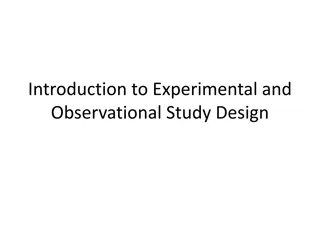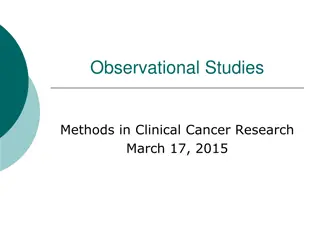Quantitative Research Designs in Health Research
Quantitative research designs play a crucial role in health research, offering various methodologies like experimental and observational designs. Observational designs are commonly used and can establish associations but not causality. Longitudinal designs track outcomes over time, providing valuabl
4 views • 25 slides
Observational Studies in Epidemiology
Delve into the realm of observational studies in epidemiology, exploring concepts such as error, bias, and confounding. Discover the significance of various study designs, from case reports to prospective cohort studies, in elucidating associations and establishing causality in non-communicable dise
2 views • 58 slides
Qualitative vs. Quantitative Approaches in Health Research
Exploring the different methodologies, paradigms, and methods used in health research, this content highlights the distinction between qualitative and quantitative designs. It covers research questions, aims, objectives, hypotheses, and various quantitative approaches such as experimental and observ
3 views • 28 slides
Clinical Trials: Types and Designs
Clinical trials are essential research studies that evaluate new tests and treatments to improve human health outcomes. They involve various phases, designs, and purposes, such as treatment trials, prevention trials, and observational studies. Different types of clinical trial designs include experi
7 views • 18 slides
Propensity Score Methods for Reducing Confounding in Studies
This content discusses the use of propensity score methods to address confounding in observational studies, comparing randomized control trials (RCTs) with observational studies, explaining the potential outcome framework, average treatment effects, and common assumptions made in these methods to re
0 views • 12 slides
Einstein Telescope: Observational Science and Board Details
Delve into the world of observational science with the Einstein Telescope (ET). This comprehensive overview covers the involvement of Flanders researchers, gravitational wave sources, ET's detection capabilities, and its significant contributions to black hole and neutron star properties. Learn abou
1 views • 12 slides
Fisheries Management and Observational Requirements for Ocean-Related Variables
This content provides insights into observational requirements for ocean-related variables concerning fisheries, focusing on marine fish production in CRFM countries, the Flyingfish Management Plan, Caribbean Spiny Lobster management, and other fisheries management plans. It discusses the main objec
0 views • 18 slides
Observational Constraints on Viable f(R) Gravity Models Analysis
Investigating f(R) gravity models by extending the Einstein-Hilbert action with an arbitrary function f(R). Conditions for viable models include positive gravitational constants, stable cosmological perturbations, asymptotic behavior towards the ΛCDM model, stability of late-time de Sitter point, a
2 views • 12 slides
Essential Elements of Clinical Trial Protocols
Understanding the key components of a clinical trial research protocol is essential for conducting successful studies. This includes identifying session objectives, discussing trial protocol contents, exploring observational study elements, and learning about reporting guidelines. Study objectives f
3 views • 25 slides
Choosing Between Observational Study and Experiment in Research
Observational studies involve recording data without interfering with subjects, while experiments impose treatments on subjects to establish cause and effect. A well-controlled experiment is crucial for determining causation, while observational studies can provide quick results at lower costs. Each
0 views • 24 slides
Overview of Observational Techniques and Student Talks in Astronomy
This content covers observational techniques, student talks, and dates related to various astronomical topics such as gamma-ray astronomy, basics of gamma-ray interaction, scintillators and solid-state detectors, Compton telescopes, and pair telescopes. It provides insights into the main processes i
0 views • 23 slides
Observational Studies vs. Experiments in Statistical Analysis
Explore the distinction between observational studies and experiments in statistics through practical examples like a Stat instructor evaluating a review session's impact on test scores. Learn about sampling methods, bias avoidance, and the implications of statistical study design. Discover how anal
1 views • 12 slides
Observational Research Methods
Observational research methods involve systematic observation of behaviors and can be used in various study designs such as experimental, correlational, and descriptive research. This type of research aims to provide insights into real-world behaviors with a focus on ecological validity. The process
0 views • 14 slides
Experimental Design and Bias in Statistics
Explore key concepts in statistics such as observational studies, experiments, bias, and sampling methods. Delve into the difference between observational studies and experiments, understand the impact of bias in research, and learn about sampling techniques like simple random sampling and stratifie
0 views • 22 slides
Enhancing Observational Skills through the 5 Senses and Devices
Explore how the 5 senses - sight, touch, hearing, taste, and smell - interact with our environment and how observations can be enhanced using specialized devices beyond human senses. Discover examples like a graduated cylinder, microscope, spring scale, wind vane, and compass that extend observation
0 views • 146 slides
Survival Analysis in Clinical Trials
Survival analysis plays a crucial role in analyzing data from randomized clinical trials, observational studies, and experiments. It involves estimating the survival function, conducting the log-rank test, and identifying when to use this analytical approach. Elements of survival experiments, standa
2 views • 73 slides
Effect of Time of Day on Bird Species Richness and Individuals
The study investigates how the time of day impacts the species richness and number of individuals of birds at a specific feeder in Longwood University's Environmental Education Center. Through observational studies and counting, the researchers aim to determine if there are differences in bird popul
1 views • 20 slides
Study Design Considerations for Observational Comparative Effectiveness Research
This presentation outlines key considerations for study design in observational comparative effectiveness research, including rationale for design choice, defining start of follow-up, inclusion/exclusion criteria, exposures of interest, outcomes, and potential confounders. It discusses various study
0 views • 16 slides
Methods for Quantifying Efficacy-Effectiveness Gap in Randomized Controlled Trials
This research discusses the quantification of the efficacy-effectiveness gap in randomized controlled trials (RCTs), particularly focusing on examples in Acute Respiratory Distress Syndrome (ARDS). It explores the challenges of RCTs, ethical considerations, and the use of observational data for caus
0 views • 8 slides
Pasta Phase in Neutron Stars: Upper Limits and Observational Effects
Investigating the impact of pasta phase on neutron star observables, this research by William Newton, Michael Gearheart, Josh Hooker, and Bao-An Li discusses the crust composition, transition densities, and compressible Liquid Drop Model (CLDM). The study explores the uncertainties in symmetry energ
0 views • 30 slides
Using Observational Data to Emulate Trials
Elizabeth Williamson, Associate Professor of Biostatistics, discusses the use of observational data to emulate trials, providing valuable insights for informing future randomized controlled trials (RCTs) and hypothesis generation. The examples presented demonstrate how routinely collected data can c
0 views • 38 slides
Observational Phenomena in Axially Symmetric Spacetimes with Non-Negative Cosmological Constant
This study delves into observational phenomena in spacetimes with non-negative cosmological constants, focusing on photon motion, Kerr-de Sitter geometries, and shadows of Kerr-de Sitter naked singularities. Explore related concepts such as spherical photon orbits, measuring NS spin, and equations o
0 views • 18 slides
Considerations for Statistical Analysis in Observational Research
Careful statistical analysis is crucial in observational comparative effectiveness research to address confounding factors. This involves descriptive statistics, unadjusted analyses, traditional regression models, propensity scores, instrumental variables, and more.
0 views • 15 slides
Sensitivity Analysis in Observational Research
Observational studies rely on various assumptions, and sensitivity analysis helps assess the impact of these assumptions on study results. Explore key aspects such as unmeasured confounding, comparison groups, exposure definitions, and more.
0 views • 16 slides
A Defence of Some Low Observational Estimates of Effective Climate Sensitivity
This content discusses low observational estimates of Effective Climate Sensitivity, including the definitions of Equilibrium Climate Sensitivity and Effective Climate Sensitivity by the IPCC, energy balance models, and radiative response coefficients used for evaluation. References to studies by pr
0 views • 28 slides
Clinical Instructor Orientation & Student Placement Guidelines
This content covers objectives, instructor responsibilities, group placements, observational experiences, and emergency codes in a nursing education setting. It emphasizes guidelines for student placements, observational experiences, and emergency protocols.
0 views • 34 slides
S1&2 ART Home Learning
Engage in a series of art activities focusing on visual elements and observational drawing. Tasks include researching visual elements such as line, shape, form, tone, colour, texture, and pattern. Practice observational drawing by depicting objects like mugs, apples, shoes, eyes, hands, and crisp pa
0 views • 20 slides
Observational Techniques Meeting #4 Presentation
This presentation covers various observational techniques including celestial, ecliptic, and galactic coordinates, along with coordinate conversion tools, dust maps, and galactic dust extinction maps. It also includes information on historical and modern catalogs and surveys, highlighting significan
0 views • 12 slides
Observational Techniques Meeting Insights
This collection presents images and resources related to observational techniques meetings, celestial coordinates, ecliptic & galactic coordinates, coordinate conversion, dust maps, galactic dust extinction maps, catalogs and surveys, sky surveys, and archives. Explore historical and modern catalogs
0 views • 84 slides
X-ray Emissions from Magnetic Polar Regions of Neutron Stars - A Study
Investigate the X-ray emissions originating from the magnetic polar regions of neutron stars through theoretical and observational studies conducted by Hajime Inoue and collaborators. The theoretical study by Inoue (2020) published in PASJ provides insights, while the observational study by Kondo, D
0 views • 16 slides
Observational Study on Diabetic Retinopathy and Cataract Surgery
Limited data on visual outcomes in diabetic individuals undergoing cataract surgery prompted an observational study to estimate the incidence of macular edema post-surgery. The study involved 329 participants from multiple sites, with 14 dropouts, and achieved a high completion rate for both follow-
0 views • 22 slides
Fundamentals of Clinical Research Overview
Clinical research fundamentals cover topics like research definitions, types (interventional, observational), clinical trials (sponsorship, industry vs. investigator-initiated), and funding sources (grant-funded, industry-sponsored). Understanding these basics is crucial in the realm of medical rese
0 views • 59 slides
Understanding Observational Methods for Affective Transitions in Real Classrooms
Explore various observational methods for studying affective transitions in real classrooms, including survey results, probing questions, and preferred methods. Learn about advantages and disadvantages of each method and participate in voting for the most effective approach.
0 views • 95 slides
Driving Applications in ASPEN: Informing NOAA About Community Observational Needs
Discover the driving applications in ASPEN and the suggested process to inform NOAA about the community's diverse set of corresponding observational needs. Explore climate research, CO2 flux estimates, flood forecasting, and more in this comprehensive overview of Earth System driving applications.
0 views • 15 slides
Analysis of Bezlotoxumab Efficacy and Safety in Observational Studies
Explore the efficacy and safety of Bezlotoxumab through meta-analyses of observational studies. Analyze event rates, serious adverse events, and risk ratios to understand the impact of Bezlotoxumab in treating rCDI. Subgroup analysis delves into adverse effects like pyrexia and nausea when Bezlotoxu
0 views • 4 slides
Understanding Generalizability and Decision Studies in Observational Research on Teaching
Explore the importance of observational data in educational research, focusing on generalizability and decision studies for teaching practices. Learn about the design, validation, and reliability assessment using observational protocols and statistical techniques.
0 views • 12 slides
Understanding Experimental and Observational Study Design
Explore the fundamentals of experimental and observational studies, including the distinction between units in experimental and observational studies, factors, treatments, and randomization processes. Learn about completely randomized and blocked designs, as well as standard experimental design appr
1 views • 8 slides
Understanding Observational Methods in Research
Explore different types of observational methods, such as participant and non-participant observations, covert and overt observations. Learn about the strengths and limitations associated with each method and their application in various research settings.
0 views • 31 slides
Methods in Clinical Cancer Research: Observational Studies and Experimental Designs
Explore the methods used in clinical cancer research, including observational studies like prospective cohort and case-control studies, as well as experimental designs focusing on controlled exposure and treatment variables. Understand the differences between observational and experimental approache
0 views • 58 slides
Effective Policy Statement on Packed Data in Product Observational
In the context of a recent decision by the Management Council, a policy statement has been made regarding the inclusion of Packed Data Fields in PDS4 Product Observational. The policy outlines exceptions for DSN and raw radio science data and proposes follow-up actions for non-compliant deliveries.
0 views • 4 slides

